
A CONVERSATION between A REVIEWER WITH BATTLE FATIGUE and A REVIEWER WHO CONTINUES TO LOVE THE THEATER
(A PLAYLET)
BATTLE FATIGUE: I sometimes feel that I spend so much time in the theater that I’m beginning to suffer from battle fatigue.
TENDER LOVING CRITIC: Burnt out?
BATTLE FATIGUE: Yeah, a little. It gets hard to know what one is seeing. Like, did I see a particular show last night or was it the night before? And if it was the night before last, then what did I see last night?
TENDER LOVING CRITIC: You don’t confuse one with the other, do you? I mean, when it comes time to write about them.
BATTLE FATIGUE: Of course not. Although’¦.
TENDER LOVING CRITIC: Although?
BATTLE FATIGUE: One can never be sure. Look back and you realize that while you never forget the ones that are truly remarkable, it is amazing how much one season blurs into another, how little impact so much of what we see makes.
TENDER LOVING CRITIC: But you love the theater. You always have.
BATTLE FATIGUE: I know what you’re trying to do. Get me to be sentimental. Is that what it is? Huh?
TENDER LOVING CRITIC: Does being in love with theater mean being sentimental about it?
BATTLE FATIGUE: Actually, no! Being in love with the theater means wanting everything to be better than it is. It’s like being in love with anything. There’s great elation. And even greater disappointment. And there’s never wanting to give up on it, if it means that much.
TENDER LOVING CRITIC: Well, I’ve known you to give up on people throughout your life, but I’ve never known you to give up on theater.
BATTLE FATIGUE: There’s some truth to that but, you know, push comes to shove, even though I’ve had so many enriching experiences in the theater or at the movies or reading a book, it’s the people I’ve loved who mean so much more to me. Who taught me the most. Maybe it’s the laughter. Maybe it’s being able to fight back. Going to the theater is so damned’¦
TENDER LOVING CRITIC: Like letting someone else do all the work?
BATTLE FATIGUE: And yet it requires a lot of work to dredge up what a creative artist is trying to do. Trying to say! Anyway, going to the theater is so’¦.I don’t know’¦.so stationary. But, it’s not just that. Sometimes, it’s so exhausting’¦it could be my age’¦that you just hope and pray sometimes for a good time. It’s not that serious art doesn’t give me great pleasure. It does. But still there are times when going to the theater seems like’¦.seems like too much of a struggle.
TENDER LOVING CRITIC: For example?
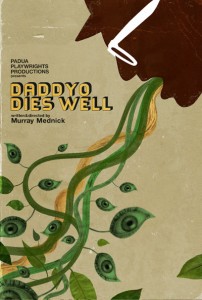 BATTLE FATIGUE: Take DaddyO Dies Well. You know, it’s by one of the unique voices in contemporary theater – Murray Mednick – and it’s being done with great love, but it’s so hermetically sealed. So private. It doesn’t let you in. You try and try. You force yourself in for what it’s worth. But it doesn’t pay you back for the effort you make. It’s all words and symbolic gestures. There’s so little of the spontaneity one expects when one goes to the theater. There’s this spiritual part of it that begins to sound like just so much mumbo-jumbo. Very distracting. You want to admire it, but it doesn’t like you.
BATTLE FATIGUE: Take DaddyO Dies Well. You know, it’s by one of the unique voices in contemporary theater – Murray Mednick – and it’s being done with great love, but it’s so hermetically sealed. So private. It doesn’t let you in. You try and try. You force yourself in for what it’s worth. But it doesn’t pay you back for the effort you make. It’s all words and symbolic gestures. There’s so little of the spontaneity one expects when one goes to the theater. There’s this spiritual part of it that begins to sound like just so much mumbo-jumbo. Very distracting. You want to admire it, but it doesn’t like you.
TENDER LOVING CRITIC: Can a playwright ask too much of a reviewer?
BATTLE FATIGUE: That’s not the point. Playwrights should be able to say anything they want. A reviewer has to be up the task of hearing what’s being said. Listen, playwrights are often way ahead of their reviewers. And when you’re dealing with tragedy – of which there’s not nearly enough in these days of irony and glibness – as Mednick or John Steppling is doing, you want to cheer. But’¦I don’t know how to say this’¦DaddyO Dies Well is cheerless and, worse, impenetrable.
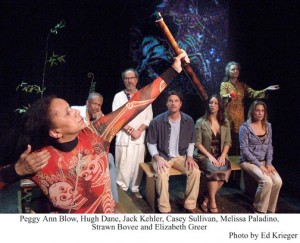 TENDER LOVING CRITIC: You used to think Murray was a wonderful writer.
TENDER LOVING CRITIC: You used to think Murray was a wonderful writer.
BATTLE FATIGUE: He was. And he is. But maybe I was younger then and more willing to get into the fray. Maybe I have seen too much death recently and I haven’t quite known how to deal with it. But just bring up the subject these days and I can feel the tears welling up. But when DaddyO died, I was strangely unmoved.
TENDER LOVING CRITIC: So you like Mednick but not his play
BATTLE FATIGUE: If it was only as easy as that. That’s what audiences do. They either like something. Or they don’t like it. Sometimes, it’s just good to be an ordinary member of the audience. I liked that! I hated that! You know?
TENDER LOVING CRITIC: So you did like the play?
BATTLE FATIGUE: No.
TENDER LOVING CRITIC: Well!
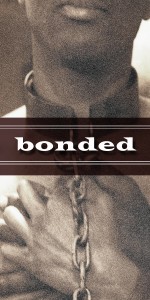 BATTLE FATIGUE: Every play has its own thing, you know? Sometimes you know a play isn’t all that it could be, but what it is is far more important than what it isn’t. Take bonded. Maybe the gay relationship in the play is romanticized. Maybe it ends a bit abruptly. Of course, if you just looked at it objectively as a piece of theater, you can say that some of the writing is beautiful, that it has been impeccably staged and acted, but that doesn’t begin to tell you what really makes one want to sing its praises and even overlook its flaws. Donald Jolly doesn’t only write well, he has something to say about slavery that made me listen intently, that told me things I had never thought about before. That’s what theater at its best is capable of doing. It is an important play. I look forward to what Donald Jolly writes next.
BATTLE FATIGUE: Every play has its own thing, you know? Sometimes you know a play isn’t all that it could be, but what it is is far more important than what it isn’t. Take bonded. Maybe the gay relationship in the play is romanticized. Maybe it ends a bit abruptly. Of course, if you just looked at it objectively as a piece of theater, you can say that some of the writing is beautiful, that it has been impeccably staged and acted, but that doesn’t begin to tell you what really makes one want to sing its praises and even overlook its flaws. Donald Jolly doesn’t only write well, he has something to say about slavery that made me listen intently, that told me things I had never thought about before. That’s what theater at its best is capable of doing. It is an important play. I look forward to what Donald Jolly writes next.
TENDER LOVING CRITIC: So Jolly is right at this moment what Mednick was once upon a time?
BATTLE FATIGUE: It’s not about that. About either/or. About standing one writer up against another. But, yes, Jolly seems to be saying something that matters to me right now. It made its impact. Mednick’s play is going to require some thinking about. But, on the surface, it’s safe to say that what he has to say doesn’t have the urgency of Jolly’s play. One play reaches inward. The other reaches out. I like the one that allows me entry. Both made me think.
TENDER LOVING CRITIC: So you’re positive about both. You see? You do still love the theater.
BATTLE FATIGUE: Stop with this positive/negative crap. I don’t always have the luxury to be evenhanded about anything. And another thing. You don’t always know where something is coming from. You just can’t anticipate the kind of experience you’re going to have in the theater. I always hope for the best.
TENDER LOVING CRITIC: And yet you’re so easily disgruntled when you don’t like something.
BATTLE FATIGUE: I wouldn’t use the word “easily.” I am often dismayed by my being disgruntled. Particularly when I seem to be the only person in the world who isn’t bowled over by a particular evening in the theater. Sometimes I just have a pet peeve. And my pet peeve at the moment is what is being done to Shakespeare.
TENDER LOVING CRITIC: Even when you get pissed off, there’s love in it. You love Shakespeare. You don’t like it when you feel he has been done what you think is a disservice.
BATTLE FATIGUE: It’s not as simple as that. The problem I think is that everyone’s afraid to do Shakespeare straight. To just do the play and still come up with some interesting overview that makes you feel as if you’re seeing the play for the first time. Peter Brook did that with A Midsummer Night’s Dream and King Lear and, in many ways, you never have to see another production of either play if you’ve seen them. The Cheek by Jowl production of As You Like It was wonderful. Gender bending never seemed so potent before. It was as if had been written yesterday. But, for a long time now, one can’t seem to do Shakespeare without coming up with a “concept.”
TENDER LOVING CRITIC: What’s wrong with that?
BATTLE FATIGUE: Nothing. In principle. It’s just that too often the play has to be shoehorned into the concept.
TENDER LOVING CRITIC: For example.
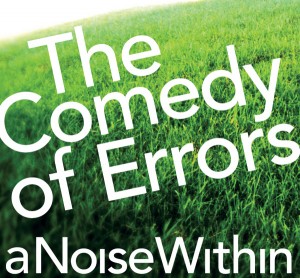 BATTLE FATIGUE: For example. The Comedy of Errors in its current incarnation at A Noise Within. Terrific idea. Have the members of a burlesque theater do a play by Shakespeare. Well, just imagine how really funny it would be if they were doing one of the tragedies. But for a bunch of vaudevillians to do what is already a burlesque of sorts doesn’t strike me as particularly amusing. Mind you, as the evening gets broader – and I have to admit there’s some really good timing involved – the audience roars with delight. But a casual observer wouldn’t be completely wrong if he thought he had stumbled upon Amateur Night in Glendale. What really saddened me about this is that I think the director – and creator of this concept – Michael Michetti? He’s someone whose work is often staggering. But if I hadn’t seen the beautiful work he did on Carousel and The Twentieth Century Way, this time around, the best I could muster, in terms of praise, is that Michetti shows a lot of promise. I left the theater humming the score of The Boys From Syracuse. Now, that was a great way of conceptualizing Shakespeare. Rodgers and Hart were faithful to Shakespeare and upped the ante by writing one of their greatest scores.
BATTLE FATIGUE: For example. The Comedy of Errors in its current incarnation at A Noise Within. Terrific idea. Have the members of a burlesque theater do a play by Shakespeare. Well, just imagine how really funny it would be if they were doing one of the tragedies. But for a bunch of vaudevillians to do what is already a burlesque of sorts doesn’t strike me as particularly amusing. Mind you, as the evening gets broader – and I have to admit there’s some really good timing involved – the audience roars with delight. But a casual observer wouldn’t be completely wrong if he thought he had stumbled upon Amateur Night in Glendale. What really saddened me about this is that I think the director – and creator of this concept – Michael Michetti? He’s someone whose work is often staggering. But if I hadn’t seen the beautiful work he did on Carousel and The Twentieth Century Way, this time around, the best I could muster, in terms of praise, is that Michetti shows a lot of promise. I left the theater humming the score of The Boys From Syracuse. Now, that was a great way of conceptualizing Shakespeare. Rodgers and Hart were faithful to Shakespeare and upped the ante by writing one of their greatest scores.
TENDER LOVING CRITIC: At least it reminded you of something you loved.
BATTLE FATIGUE: But that’s not the same as saying that I loved The Comedy of Errors. Or that a rollicking production of it wouldn’t be a lot of fun. Or that it could stand on its own. Hell, there’s a “concept” production of it right now in New York and what I read about it echoes some of my feelings about this one. Leave it alone. It may not be Shakespeare’s best comedy but there’s a wealth of genuine laughter to be found in it if it were just done as written. But even more interesting is seeing a production of a Shakespearean play that is fine on so many levels and still manages to be seriously misguided.
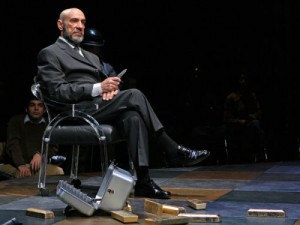 TENDER LOVING CRITIC: Is that The Merchant of Venice?
TENDER LOVING CRITIC: Is that The Merchant of Venice?
BATTLE FATIGUE: Right. I mean, what do you say about a concept that takes place in a “near future” which looks suspiciously like the fifties? In fact, why does so much these days seem to be patterned on the fashion statement of MAD MEN? And even though there are computers and iPhones, why does it end with a recording of songstress Rosemary Clooney, who embodies the fifties as much as any performer of the era? And it may work for others, but doesn’t anybody feel, as I did, that seeing characters in fifties get-ups while speaking Elizabethan poetry is a little peculiar? And when did Venice ever look like Wall Street? Not in the fifties. Not in the future. Venice may be slowly rotting, but even if it were completely underwater, it would have more charm than Wall Street.
TENDER LOVING CRITIC: But doesn’t it make clear that Shylock is a businessman? A suit and tie will do that, it seems to me. And surely bringing it up to date makes a comment that anti-Semitism has a way of reasserting itself.
BATTLE FATIGUE: Didn’t Arthur Miller say that?
TENDER LOVING CRITIC: It wouldn’t surprise me.
BATTLE FATIGUE: To tell the truth, I’ve never seen a production of The Merchant of Venice so virulent and ugly in its anti-Semitism. And, by contrast, such a subtle and authentic Shylock as the one F. Murray Abraham evokes with such pained anger. If everything in the production was as good as Abraham is, I probably wouldn’t have been so upset by what I saw. But, aside from the elegance of the lovers Bassanio and Portia, almost everything else seemed to work against it. Some truly grating performances, for one. I’m thinking especially of the Gratiano. And so much letting go of pentameter in order to stretch a sentence out so that a final word could have a comic effect. And it seems to have been forgotten that this is a comedy. Or, at least, the comic elements seem either to be overdone or not dealt with at all. Look, if you leave the theater unsatisfied, you’ve got to think about what went wrong.
TENDER LOVING CRITIC: Are you being too purist? Or perhaps too academic?
BATTLE FATIGUE: Come on. I’m neither.
TENDER LOVING CRITIC: Would it be so bad if you were both?
BATTLE FATIGUE: I don’t know. I so want to have a good time.
TENDER LOVING CRITIC: Surely good times don’t elude you.
BATTLE FATIGUE: You’re right. I had a really good time the other night.
TENDER LOVING CRITIC: Really? What was it? Tell. Puh-leez.
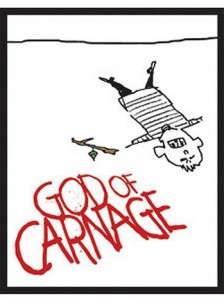 BATTLE FATIGUE: (slightly shamefaced) God of Carnage.
BATTLE FATIGUE: (slightly shamefaced) God of Carnage.
TENDER LOVING CRITIC: Why do you seem so embarrassed? If you had a good time.
BATTLE FATIGUE: Because I can’t tell you how many people I respect and admire think so little of the play. And, you know what? They’re not wrong. It’s not the play. But what people forget is that, in the theater, it’s the experience you have. So let me tell you right off the bat that Yasmina Reza writes jokes, not plays, and that her plays even seem like rip-offs of much better’¦much deeper’¦plays. Her work makes me think of Chinese dinners. You know what I mean?
TENDER LOVING CRITIC: You mean it’s delicious but you’re still hungry two hours later?
BATTLE FATIGUE: Got it. Absolutely. And yet’¦..
TENDER LOVING CRITIC: Yes? I’m waiting.
BATTLE FATIGUE: She’s got the best comedy director in the world right now on her side.
TENDER LOVING CRITIC: Matthew Warchus?
BATTLE FATIGUE: If you saw what he did with a piece of fluff called Boeing, Boeing you’d know what I mean. Even as farces go, it’s not a particularly good one. And yet, on the stage, with the great’¦I mean GREAT’¦ help of Mark Rylance’s once-in-a-lifetime performance, it was one of the most memorable experiences I’ve ever had. And that doesn’t even begin to describe the perfect three evenings of theater he got out of Alan Ayckbourn’s The Norman Conquests, in which he finally got the world to recognize just how important a playwright Ayckbourn is. The thing is that he knows how to build comic moments so brilliantly that, if there’s something even remotely serious underneath, it just manages to come to the surface as if by magic. And even if there isn’t’¦..
TENDER LOVING CRITIC: Very clever. You’re getting around to what you were saying in the first place. Why can’t you go to the theater and have a good time?
BATTLE FATIGUE: Boy, do you know me! Who are you anyway?
TENDER LOVING CRITIC: Okay, I’m listening.
BATTLE FATIGUE: Take James Gandolfini. When he gets bilious with rage, when the brute in his character is finally released, his face gets so red you think he’s going to have a heart attack and, instead of worrying about it, you’re laughing your head off. I don’t want to give anything away if you haven’t seen it yet, but Hope Davis has a moment that is horrific but still hilariously funny. And just watching her all bottled up with intense frustration and then letting go is what I call great comic acting. Or Jeff Daniels who gives a new definition to sang-froid and whose casual indifference hides a great big baby inside. He’s wonderful. Period. Timing? He seems to have invented it. You know, when I saw it in New York, it was Marcia Gay Harden who created the most vivid character’¦ so recognizable and yet made so crazy by her impossible values’¦ and she’s better than ever; but, in this happy reunion of the four actors, it is foolhardy to think one is better than the other. This is inspired star-powered ensemble work. The play isn’t all that good? Who cares? Even the cavernous Ahmanson stage cannot diminish the brilliance on display (that is, if you have decent seats’¦which, I humbly confess, I did). Oh, yes, I had a good time. Only a sourpuss would think otherwise.
TENDER LOVING CRITIC: But?
BATTLE FATIGUE: But. I want more. I always want more.
TENDER LOVING CRITIC: You’ll never be happy.
BATTLE FATIGUE: That’˜s right. Isn’t it wonderful?
harveyperr @ stageandcinema.com
Daddyo Dies Well
scheduled to close May 22 at time of publication
for tickets, visit www.plays411.com/DaddyO
bonded
extended to April 24 at time of publication
for tickets, visit www.thelatc.org
The Comedy of Errors
scheduled to close May 14 at time of publication
for tickets, visit www.anoisewithin.org
The Merchant of Venice
scheduled to close April 24 at time of publication
for tickets, visit http://thebroadstage.com/venice
God of Carnage
scheduled to close May 29 at time of publication
for tickets, visit http://www.centertheatregroup.org/

{ 3 comments… read them below or add one }
I loved this set of reviews more than many a play I’ve sat/squirmed through.
Thank you, Thank you.
What an enjoyable exercise! You took all the work out of it for the reader.
No need to read between the lines or disagree or formulate another opinion. You did it all and we can enjoy the dialectic. It’s a whole new form of theater reviewing.
Bravo!
When the critic becomes the teacher, the playright has lost his lead. To create a Socratic dialogue of inner truth and a disdain for puffery while discussing the art of words to a hungry audience, then I am ready to forgo the theatrical experience and savor the critic’s duologue. Someone take note.